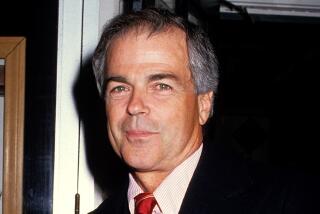‘77 Sunset Strip’: A Kookie Legacy
Time has a habit of getting away from you. One day you’re learning to tie your shoes and the next day you’re adjusting to bifocals.
Driving along Sunset a couple of weeks ago I saw a construction fence around the long-closed restaurant--it was once called Dino’s--that had been the location for the fictional joint that gave the early television series “77 Sunset Strip” its name.
The series had hit the air in 1958, a few months before I hit Los Angeles, so our histories were somehow entwined. There would be riots on the Sunset Strip a few years later, but for the moment the show seemed to confirm a particular vision of the city.
The show’s heroes were Efrem Zimbalist Jr. and Roger Smith, with the late Louie Quinn as a side-of-the-mouth sidekick and a young, long-haired New York actor named Edd Byrnes as the restaurant’s hip parking attendant.
As I drove past the site, I remembered talking to Zimbalist about a piano sonata, I think it was, that he was composing but that he had been unable to get back to once his life was taken over by the series (which ran until 1964 and established a trend in cool, hourlong adventures).
By coincidence I had recently learned that Edd Byrnes appears in the new Shelley Long comedy, “Troop Beverly Hills,” and we arranged to meet for lunch to talk about his post-”Strip” life.
Byrnes was called Kookie on the show and he did a novelty record called “Kookie, Kookie, Lend Me Your Comb,” which became a big hit. The Kookie characterization threatened to be one of those mixed blessings which give you fame, along with an image that clings like lint.
He is now 55 but, in the enviable way actors have, looks a decade or so less than that. In his urbane way he suggests the owner of 77 Sunset Strip, not even the parking concessionaire.
Nothing in his subsequent career has had the outreach, let’s say, of the role as Kookie, but Byrnes has kept busy, working in movies and television here and overseas. In “Troop Beverly Hills,” he plays an American actor just back from making films in Italy; it is typecasting of a sort.
“I’m happier now than I was when I was doing ’77 Sunset Strip,’ ” Byrnes said at lunch. His son Logan, from his marriage to Asa Maynor, is now 24. Byrnes, who never remarried after he and Maynor separated, has a house near Venice and the beach.
The useful legacy of the Kookie days is that it makes him an attraction in dinner-theater productions and summer stock and for appearances in a growing number of ‘50s nostalgia packages, including one called “Hot August Nights” staged at Reno a few months ago.
As a Warner Bros. contract player for nearly seven years at the start of his career, Byrnes said his first on-camera lines in a small role in “Marjorie Morningstar.” He appeared in William Wellman’s last film, “Darby’s Rangers,” and in “Up Periscope” and “Yellowstone Kelly,” in which he had second billing to Clint Walker.
After “77 Sunset Strip” ended, Byrnes engineered a release from his Warners contract to make “The Secret Invasion,” a Roger Corman thriller starring Stewart Granger and Raf Vallone and shot in Yugoslavia.
Byrnes lived for a time in London at the start of the ‘70s, made commercials directed by Milos Forman and Richard Lester and appeared in “Stardust,” one of David Puttnam’s earliest ventures as producer, directed by Michael Apted. It starred rock ‘n’ roller David Essex and looked at the pop-music life.
A few years ago, Byrnes says, “There was talk of doing a new series, ‘Return to Sunset Strip.’ But Efrem and Roger wanted big money and script approval and the deal fell through. The last time the three of us were together was as presenters at the 1985 Emmys.”
It may be as well the deal fell through. “77 Sunset Strip” was very much a piece of its time. The breezy, adventurous series and the several near-dupes (e.g. “Surfside Six”) Warners made of it were a phase in the evolution of television formats. And the show’s vision of a Los Angeles, cool, cocky, mobile, was also a piece of time which now looks as dated as black-and-white television itself.
Like Los Angeles ‘58, the series was a phenomenon that can be remembered affectionately but not reprised.
“I’m looking for properties to produce and star in,” Byrnes says. “It’s the only way to go.”
More to Read
The complete guide to home viewing
Get Screen Gab for everything about the TV shows and streaming movies everyone’s talking about.
You may occasionally receive promotional content from the Los Angeles Times.






